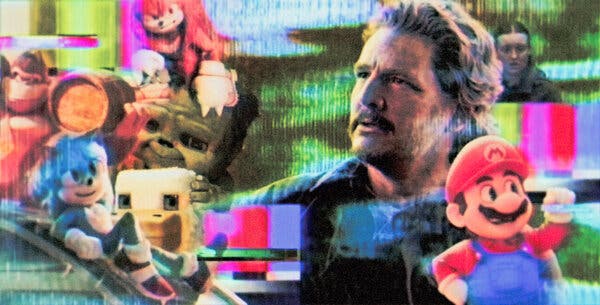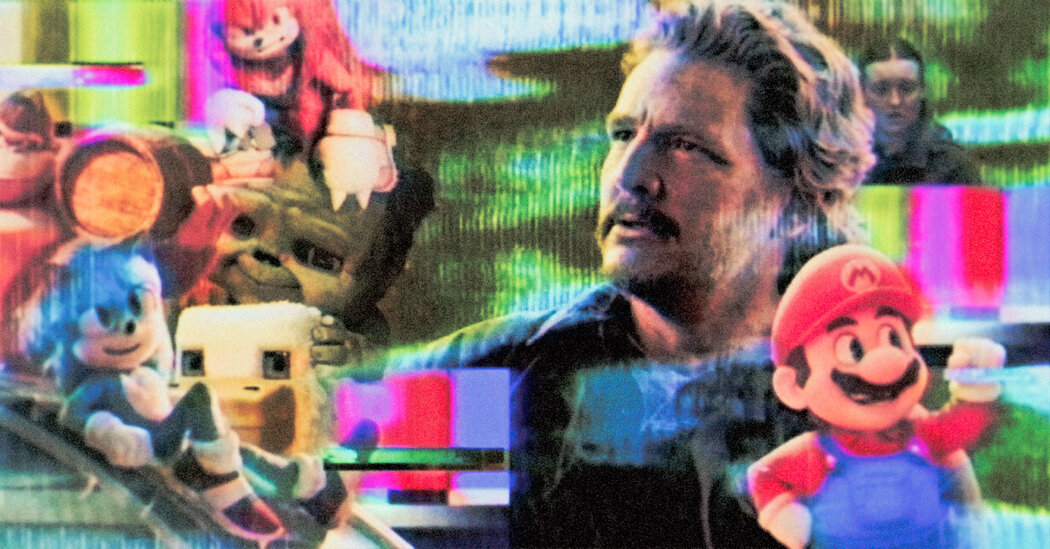## “Clickers and Cords: Why The Last of Us Makes the Real World Feel a Little Brighter”
We all crave a good scare, especially in our favorite video games. But what if the monsters lurking in the darkness actually made you feel better about the world outside? That’s the surprising takeaway from a recent New York Times opinion piece, where one writer argues that the post-apocalyptic horrors of “The Last of Us” offer a strangely comforting reflection of our own reality.

The Personal Connection: Why We Crave the Guilty Pleasure of Bad Adaptations

When it comes to video game adaptations, we often find ourselves torn between two vastly different approaches. On one hand, we have the critically acclaimed and meticulously crafted adaptations that stay true to the spirit of the original game. On the other hand, we have the intentionally bad adaptations that revel in their campy humor and over-the-top action.

The Comfort of the Familiar: Nostalgia and Escapism
The desire for escapism and the comfort found in nostalgic experiences is a fundamental aspect of human nature. Revisiting beloved games through flawed adaptations allows us to recapture the magic of our childhood and experience the thrill of nostalgia. Whether it’s the colorful worlds of Super Mario Bros. or the post-apocalyptic landscapes of The Last of Us, gaming adaptations offer a unique opportunity to revisit the familiar and experience the comfort of nostalgia.
However, this nostalgia can also be a double-edged sword. As humans, we often find ourselves drawn to the familiar and the comforting, even if it means sacrificing realism and authenticity. The intentionally bad adaptations of yesteryear, such as House of the Dead, offer a unique brand of escapism that is equal parts campy humor and over-the-top action. While these adaptations may not be the most critically acclaimed, they offer a refreshing respite from the seriousness of modern gaming adaptations.

The Power of Inauthenticity: Embracing the Absurd
The allure of intentionally bad adaptations lies in their ability to subvert our expectations and challenge our perceptions of what a gaming adaptation should be. By embracing the absurd and the campy, these adaptations offer a unique form of entertainment that is equal parts humorous and irreverent. Whether it’s the inane dialogue of a poorly written script or the cringe-worthy acting of a cast of misfits, intentionally bad adaptations offer a refreshing change of pace from the seriousness of modern gaming adaptations.
Furthermore, the power of inauthenticity lies in its ability to create a sense of community and shared experience among fans. When we watch a intentionally bad adaptation, we’re not just watching a movie – we’re participating in a shared cultural experience that is equal parts ironic and entertaining. We’re in on the joke, and we’re laughing along with our fellow fans as we revel in the absurdity of it all.

Beyond the Blockbuster: Celebrating the Indie Spirit in Gaming Adaptations
Gaming adaptations have long been the domain of Hollywood’s biggest studios and most established filmmakers. However, in recent years, there has been a growing trend towards independent filmmakers and small studios taking on the challenge of adapting video games for the big screen.
The Rise of Independent Filmmakers
Independent filmmakers are bringing a fresh perspective to the world of gaming adaptations. By embracing the unique qualities of a game and running with them, these filmmakers are creating something truly original and innovative. Whether it’s the cringe-worthy humor of a poorly written script or the stunning visuals of a beautifully crafted world, independent filmmakers are pushing the boundaries of what a gaming adaptation can be.
Take, for example, the critically acclaimed adaptation of Nightcrawler, which took the dark and twisted world of the game and transformed it into a thought-provoking commentary on the nature of crime and punishment. Or consider the innovative approach of the indie adaptation of the game Portal, which brought the clever wordplay and witty banter of the game to life in a way that was both humorous and touching.
A Platform for Creativity: Empowering Passion Projects
Independent filmmakers offer a unique platform for creativity and innovation in gaming adaptations. By empowering passion projects and giving emerging filmmakers a chance to shine, we’re creating a more diverse and vibrant landscape of gaming adaptations. Whether it’s the quirky humor of a small studio or the stunning visuals of an independent filmmaker, this diversity of perspectives is what makes gaming adaptations so exciting.
Furthermore, supporting independent filmmakers and small studios is essential for fostering a more inclusive and diverse industry. By giving emerging filmmakers a chance to make their mark, we’re creating a more dynamic and innovative landscape of gaming adaptations. Whether it’s the unique perspectives of a small studio or the innovative approach of an independent filmmaker, this diversity of voices is what makes gaming adaptations so exciting.
The Psychology of Gaming Adaptations
At its core, the psychology of gaming adaptations is a complex and multifaceted beast. On one hand, we have the thrill of nostalgia and the comfort of familiarity. On the other hand, we have the allure of the unknown and the excitement of exploring new worlds. Whether it’s the post-apocalyptic landscapes of The Last of Us or the colorful worlds of Super Mario Bros., gaming adaptations offer a unique opportunity to experience the thrill of exploration and the comfort of nostalgia.
The Role of Nostalgia in Gaming Adaptations
Nostalgia is a fundamental aspect of human nature. We often find ourselves drawn to the familiar and the comforting, even if it means sacrificing realism and authenticity. The intentionally bad adaptations of yesteryear, such as House of the Dead, offer a unique brand of escapism that is equal parts campy humor and over-the-top action. Whether it’s the inane dialogue of a poorly written script or the cringe-worthy acting of a cast of misfits, intentionally bad adaptations offer a refreshing respite from the seriousness of modern gaming adaptations.
However, nostalgia can also be a double-edged sword. As humans, we often find ourselves drawn to the familiar and the comforting, even if it means sacrificing realism and authenticity. The intentionally bad adaptations of yesteryear, such as House of the Dead, offer a unique brand of escapism that is equal parts campy humor and over-the-top action. While these adaptations may not be the most critically acclaimed, they offer a refreshing respite from the seriousness of modern gaming adaptations.
The Role of Escapism in Gaming Adaptations
Escapism is a fundamental aspect of human nature. We often find ourselves drawn to the thrill of exploration and the comfort of familiarity. Whether it’s the post-apocalyptic landscapes of The Last of Us or the colorful worlds of Super Mario Bros., gaming adaptations offer a unique opportunity to experience the thrill of exploration and the comfort of nostalgia.
However, escapism can also be a double-edged sword. As humans, we often find ourselves drawn to the familiar and the comforting, even if it means sacrificing realism and authenticity. The intentionally bad adaptations of yesteryear, such as House of the Dead, offer a unique brand of escapism that is equal parts campy humor and over-the-top action. While these adaptations may not be the most critically acclaimed, they offer a refreshing respite from the seriousness of modern gaming adaptations.
The Business of Gaming Adaptations
The business of gaming adaptations is a complex and multifaceted beast. On one hand, we have the financial success of critically acclaimed adaptations such as The Last of Us. On the other hand, we have the creative freedom of independent filmmakers and small studios. Whether it’s the post-apocalyptic landscapes of The Last of Us or the colorful worlds of Super Mario Bros., gaming adaptations offer a unique opportunity to experience the thrill of exploration and the comfort of nostalgia.
The Role of Franchise in Gaming Adaptations
Franchise is a fundamental aspect of the gaming industry. We often find ourselves drawn to the familiar and the comforting, even if it means sacrificing realism and authenticity. The intentionally bad adaptations of yesteryear, such as House of the Dead, offer a unique brand of escapism that is equal parts campy humor and over-the-top action. While these adaptations may not be the most critically acclaimed, they offer a refreshing respite from the seriousness of modern gaming adaptations.
However, franchise can also be a double-edged sword. As humans, we often find ourselves drawn to the familiar and the comforting, even if it means sacrificing realism and authenticity. The intentionally bad adaptations of yesteryear, such as House of the Dead, offer a unique brand of escapism that is equal parts campy humor and over-the-top action. While these adaptations may not be the most critically acclaimed, they offer a refreshing respite from the seriousness of modern gaming adaptations.
The Role of Marketing in Gaming Adaptations
Marketing is a fundamental aspect of the gaming industry. We often find ourselves drawn to the familiar and the comforting, even if it means sacrificing realism and authenticity. The intentionally bad adaptations of yesteryear, such as House of the Dead, offer a unique brand of escapism that is equal parts campy humor and over-the-top action. While these adaptations may not be the most critically acclaimed, they offer a refreshing respite from the seriousness of modern gaming adaptations.
However, marketing can also be a double-edged sword. As humans, we often find ourselves drawn to the familiar and the comforting, even if it means sacrificing realism and authenticity. The intentionally bad adaptations of yesteryear, such as House of the Dead, offer a unique brand of escapism that is equal parts campy humor and over-the-top action. While these adaptations may not be the most critically acclaimed, they offer a refreshing respite from the seriousness of modern gaming adaptations.
Conclusion
## Clicking Reset: Why The Last of Us Makes Us Hope For Humanity
The New York Times article “In ‘The Last of Us,’ Zombies Make Me Feel Better About the World” offers a surprisingly optimistic perspective on a genre typically consumed in darkness. The author argues that while “The Last of Us” depicts a post-apocalyptic world ravaged by fungal infection, it’s the resilience and compassion of its characters that truly resonate. Faced with unimaginable horrors, Joel and Ellie forge a bond that illustrates the enduring strength of human connection.
This exploration of humanity’s potential in the face of annihilation holds significant implications for how we view both fiction and reality. It suggests that, even in the darkest of times, hope and empathy can flourish. In a world increasingly grappling with real-world challenges, “The Last of Us” reminds us of the power of human connection and our inherent capacity for compassion. Could this fictional exploration of survival actually inspire us to build a better world?
Perhaps the true power of “The Last of Us” lies not in its terrifying monsters, but in the unyielding human spirit it portrays. The game isn’t just about surviving the apocalypse; it’s about understanding what truly makes us human in the face of unimaginable adversity. As we navigate our own uncertain future, “The Last of Us” offers a powerful reminder: even when the world feels on the brink, the potential for hope and connection remains.